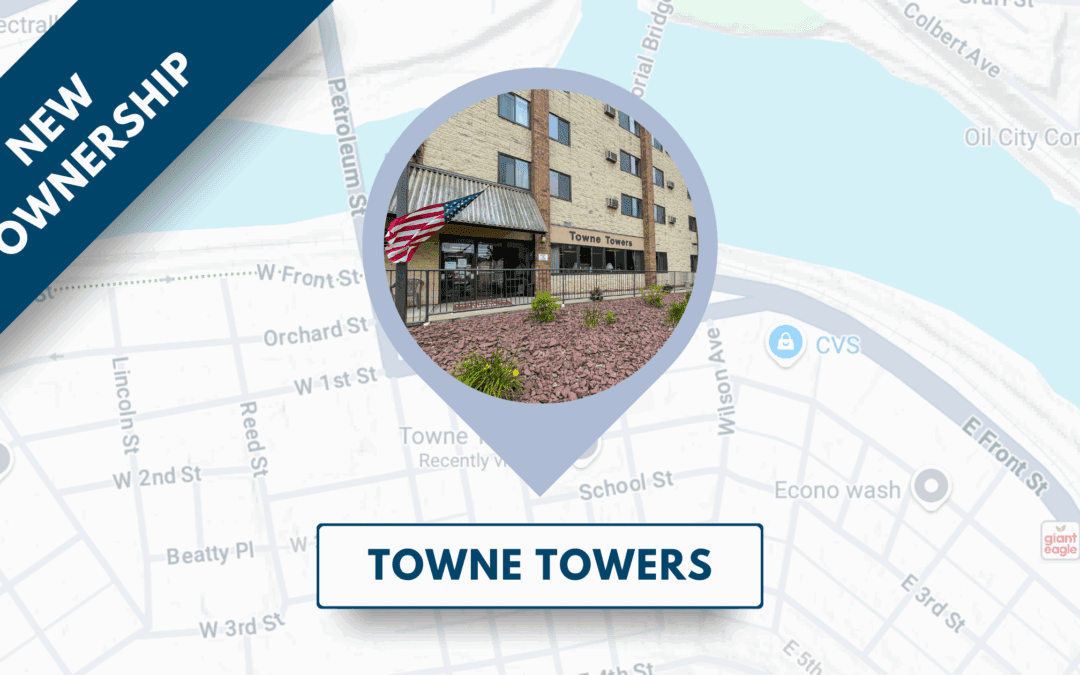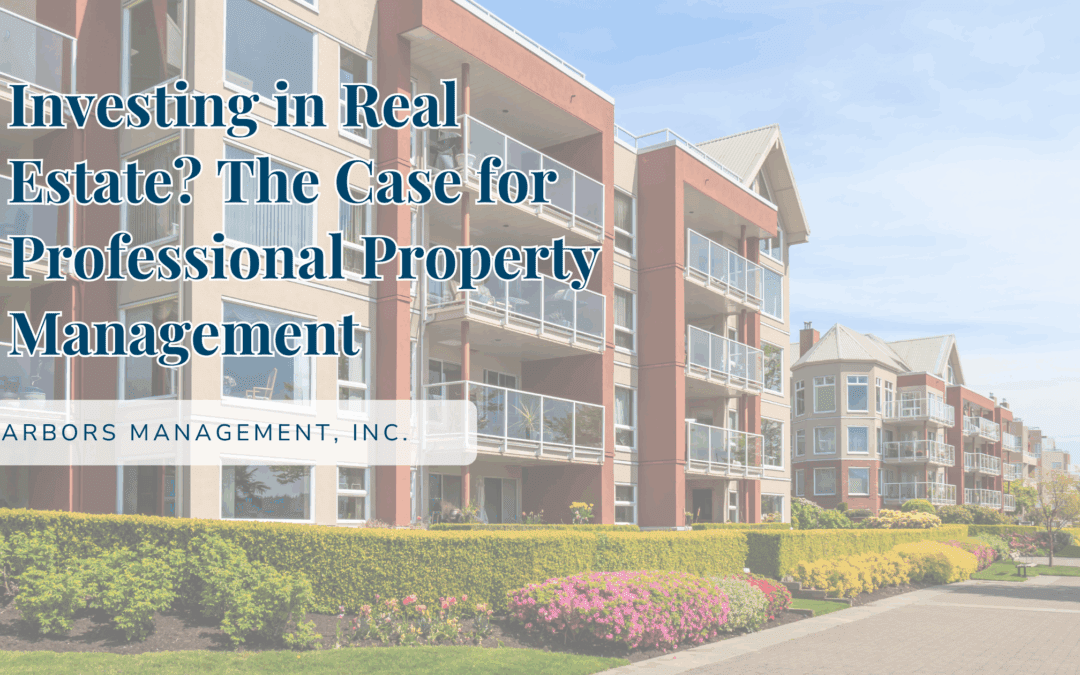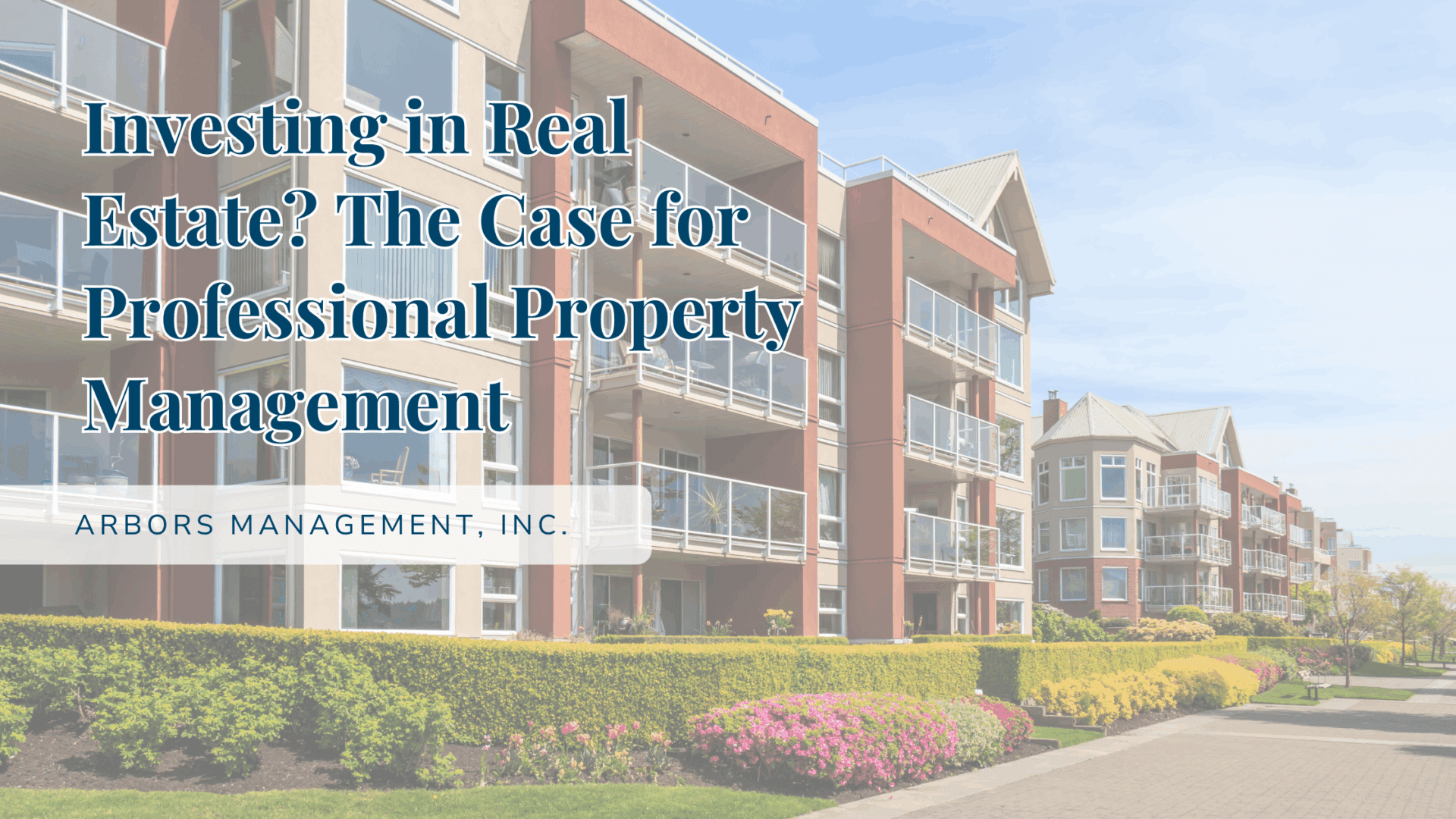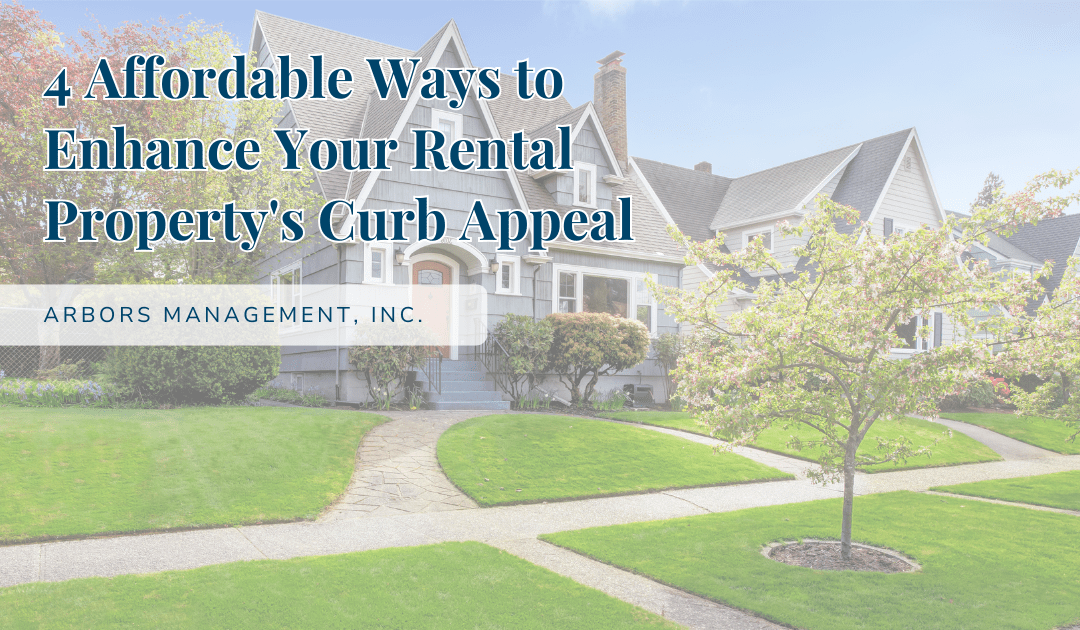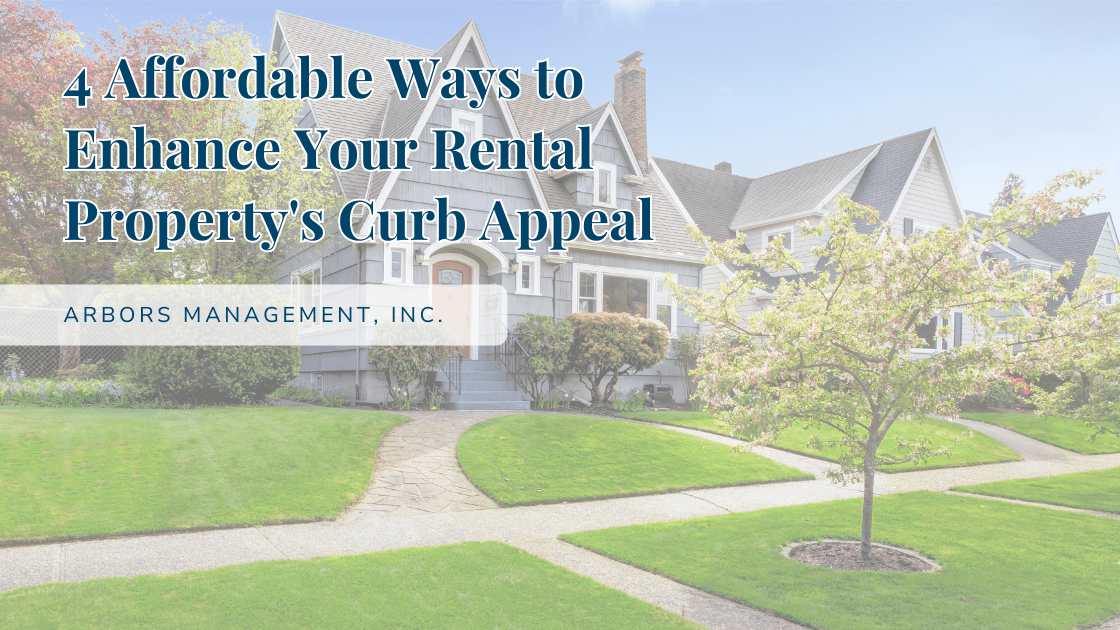
by Andrea F | Oct 1, 2025 | Blog, Featured Posts, Investment Rental Property, Low Income Tax Credit Housing, Project Based Section 8 Housing, Property Spotlights, Uncategorized
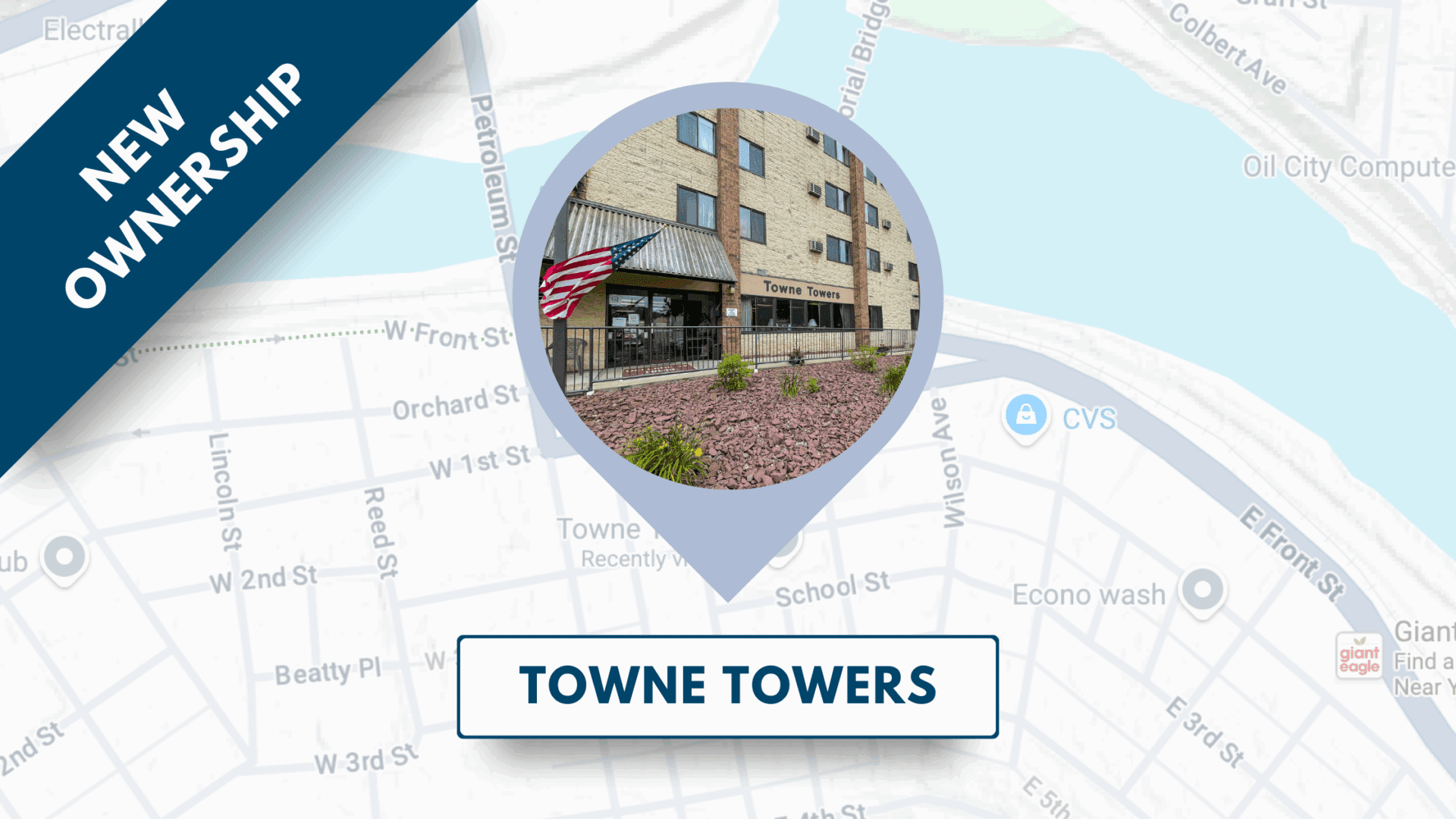
By: Andrea Faulk
Arbors Management is well-known for its impressive and consistent growth year after year. Recently, they have partnered with the new ownership team of the Towne Towers building in Oil City, Pennsylvania, as part of their latest expansion efforts.
This collaboration aims to implement significant enhancements to the building and the surrounding community. With over 40 years of expertise in property management, Arbors Management is dedicated to preserving and improving Affordable Housing in Pennsylvania, West Virginia, and Ohio.
In July 2022, Arbors Management, Inc. assumed management of Towne Towers. Since then, numerous positive changes have been introduced, including the hiring of full-time office and maintenance staff to better serve residents.
In collaboration with the new ownership team, Arbors Management, Inc. plans to invest more than $2,000,000 in renovations and upgrades for the building. This initiative aims to enhance the living experience for both current and prospective residents.The planned upgrades include:
- A new roof
- Modernized elevators
- An upgraded fire panel
- New kitchens and bathrooms
- Full building Wi-Fi
- A new camera system
- New HVAC systems
- Improved accessible units
- And much more!
Towne Towers is a 100-unit Project-Based Section 8 apartment complex designated for elderly and disabled individuals, conveniently located in the heart of Oil City, Venango County. To learn more about Towne Towers, please visit our website.
If you are interested in becoming a resident of Towne Towers, feel free to call 814-676-9315 or email TowneTowers@Arbors.com.

by Andrea F | Aug 12, 2025 | Blog, Featured Posts, Investment Rental Property, Owner Resources, Property Management Education, Rent Collection, Rental Price

Investing in Real Estate? The Case for Professional Property Management
By: Andrea Faulk
Real estate investment is often heralded as an excellent avenue for generating passive income. However, the reality of being a landlord can quickly turn that “passive” income into an active and demanding endeavor. Managing properties involves a multitude of tasks that can be both time-consuming and stressful. This is where a professional property management company can become an invaluable asset for investors.
Here’s a deeper look into why experienced investors often choose to partner with property management experts:
1. Expertise and Efficiency for Optimal Returns
-
Tenant Screening and Placement: Finding reliable tenants is crucial. Property management companies use comprehensive screening processes, including background and credit checks, employment verification, and rental history evaluations, to ensure quality residents occupy your property.
-
Optimal Rental Pricing: Setting the right rent requires a delicate balance. Property management companies conduct thorough market analyses to competitively price rentals, maximizing income while minimizing vacancies.
-
Effective Marketing: Ensure that marketing reaches the right audience to successfully fill vacancies with the ideal candidates.
2. Time Savings and Stress Reduction
-
Delegating Day-to-Day Operations: Managing a property can feel like a second full-time job. A property management company handles everything from maintenance calls to rent collection, freeing up your time for other ventures.
-
Streamlined Processes: Property management companies establish efficient systems for rent collection, maintenance requests, and accounting. They often offer online portals for tenant payments and financial reporting.
-
Peace of Mind: Knowing professionals are handling all aspects of your investment offers peace of mind, allowing you to enjoy ownership benefits without the headaches.
3. Protecting Your Investment and Minimizing Risks
-
Legal Compliance: Landlord-tenant laws are complex and ever-changing. Property management companies stay informed on legal requirements, ensuring compliance and reducing the risk of costly lawsuits or penalties.
-
Preventive Maintenance: Regular inspections and proactive maintenance are vital for preserving property value. Property management companies schedule routine maintenance and address repairs promptly, often with access to discounted contractor rates.
-
Dealing with Difficult Situations: Property management companies have the experience to handle challenging situations like late rent payments or evictions, minimizing financial losses and emotional strain.
4. Enhanced Tenant Retention and Satisfaction
-
Prompt Responses to Needs: Quick response to tenant concerns and maintenance requests leads to higher tenant satisfaction and retention, reducing turnover and vacancies.
-
Improved Tenant Relations: Professional and consistent tenant interactions foster positive relationships, leading to longer tenancies and a stable income stream.
In summary, although self-management may seem like a cost-effective option, the time investment, legal liabilities, and risk of expensive errors can outweigh any perceived financial benefits. Engaging a professional property management company enables you to utilize their expertise, enhance operational efficiency, safeguard your investment, and optimize your returns, all while enjoying a more passive income stream. A property management company can truly become your most valuable asset.
If you need help managing your property, that’s what we’re here for! Please reach out to us at 1-800-963-1280 or at monroeville@arbors.com.

by Nicole Scimio | May 2, 2025 | Blog, Featured Posts, Investment Rental Property, Owner Resources, Property Management Education, Rental Price, Uncategorized

4 Affordable Ways to Enhance Your Rental Property’s Curb Appeal
By: Nicole Scimio
Whether your rental property has curb appeal or not is incredibly important.
It can significantly impact how many applicants you draw in, who you attract, and even the amount you can charge for rent.
But with an investment property, it can be hard to keep up with appearances.
Trends change, things wear down – time takes its toll on a place.
Sometimes, a full renovation sounds great but just isn’t within your budget.
Not to worry, though!
There are plenty of ways to kick your property’s curb appeal up a notch – and with Spring finally here, now’s the time!
We’ve gathered up a few inexpensive and minimally involved ways for you to update your rental property without breaking the bank.
Tip #1: Replace Old Hardware
Refreshing your hardware doesn’t have to be difficult or expensive!
Is the doorknob or door knocker starting to delaminate from years of use and weathering?
Run to your local hardware store, pick a metallic finish that complements your property’s color scheme, and grab some new hardware in matching finishes.
You can also consider updating the porch light fixture and house/unit numbers in a matching finish!
Tip #2: Landscaping Refresh
First thing’s first: cut the lawn, pull weeds, and trim any shrubs you may have.
Add fresh mulch and some beautiful flowers in your landscaping.
You can even plant perennials – flowers that will appear every year. A few examples of perennials include peonies, poppies, black-eyed susans, irises, and more.
You can even consider putting together planters at either side of the entryway to give off a welcoming and homey look.
If you’re looking to take your outdoor revamp even further, add small solar-powered lanterns along the walkway. These are low maintenance and don’t require upkeep or constant battery changes, but add ambience and better sight of the walkway in the dark.
Landscaping can get expensive, but these tips are a fairly quick and low-cost way to revamp your property’s curb appeal.
Tip #3: Add a Fresh Coat of Paint or Stain
Sometimes a fresh coat of paint is all it takes!
Adding a fresh coat of paint or stain on your property’s front door, shudders, and decking if applicable. This small change can make your property look brand new without needing to paint the entire exterior!
Repaint or resurface your mailbox. Sometimes something as small as updating the mailbox you already have can make a world of a difference!
While painting or staining can be time consuming if you opt to do it yourself, the difference it makes is significant! The few hours or days you’ll spend on it will certainly be worth it.
Tip #4: Clean!
Don’t underestimate the power of a good deep cleaning!
Declutter the outdoor area, removing any unnecessary items, picking up any garbage that could have blown through, etc.
You can also powerwash your property’s walkways and driveway. This simple step will make any concrete surface look brand new, and is incredibly satisfying!
Algae growing on your property’s roof or siding? Consider hiring a professional to wash the surface of your investment property and bring it back to life – the difference is massive.
Curb Appeal Can Be Simple
Updating your property’s curb appeal doesn’t have to be intimidating or expensive!
These few tips can help you refresh your property and attract wonderful residents in no time.
If you need help managing your property, that’s what we’re here for! Please reach out to us at 1-800-963-1280 or at monroeville@arbors.com.

by Nicole Scimio | Feb 24, 2025 | Blog, Investment Rental Property, Tenant Education, Tenant Resources
Is Renters Insurance Worth It? Why or Why Not?
By: Trisha Jester

What Is Renters Insurance?
If you’ve ever rented an apartment or home before, you’ve likely run into the phrase “renters insurance.” Renters insurance is often required when renting a dwelling place; what exactly is it, though?
Renters insurance is an affordable way for you to protect your personal belongings in the event that there should be some type of emergency in your unit or building. Just like any other type of insurance (medical, car, homeowners, etc.), it is designed to protect and benefit the policyholder, should any emergency under the umbrella of coverage occur.
Is It Required When Renting an Apartment or House?
Here at Arbors Management, yes, renters insurance is required. Our market-rate units require that you obtain a policy for the safety of both the resident and their belongings as well as sometimes insuring the property. As mentioned in the definition, in the event that there is an emergency in the building or the resident’s unit, the resident’s renters insurance policy will cover the cost of personal items lost in said emergency.
What about for residents in Section 8 or Affordable Housing? The United States Department of Housing and Urban Development (HUD) does not permit us to make renters insurance mandatory on our Section 8 side, but it is highly recommended. Unfortunately, emergencies can happen at any property at any time. Because of this, it’s strongly encouraged to secure protection of your personal belongings, even in Affordable Housing.
While we can’t speak for other landlords, you will likely find that most landlords require renters insurance across the board. No matter who you rent from, be sure to inquire with your property manager about their policies on the matter.
Am I Responsible for Securing the Policy Myself?
Yes, you are responsible for securing it yourself. This is a personal policy that the resident is responsible for, not the landlord. While it may feel like a hassle, these policies are generally inexpensive. Oftentimes, policies cost less than $150 per year! The great thing, though, is that this relatively low expense can cover thousands of dollars of loss.
In order to obtain renters insurance, you can reach out to your current insurance agent that handles any other policies you may have. If they are unable to obtain a policy for you, they will likely be able to put you in contact with someone who can. You can also reach out to your landlord, as they may already have an agent that you can work with.
It also is important to note that your policy goes with you! If you move out of the apartment you originally purchased insurance for, you can transfer it to your new address. Be sure to reach out to your agent during your move to have your policy updated!
What are the Risks of Not Having Renters Insurance?
While securing a policy for your rental may seem unnecessary, there are risks in not doing so. Unfortunately, if your landlord has a fire or water break in the building that leaks into your unit and your belongings get damaged, the landlord’s insurance will not cover your personal losses. The landlord’s insurance will only cover the building structure itself.
Along with loss, you could potentially face fees for not securing a renters insurance policy. As mentioned above, Arbors Management, along with the majority of other property management companies and landlords, require residents to obtain a policy. If residents fail to do so, they could incur penalty fees, eviction, or even a lawsuit from management.
So, Is Renters Insurance Worth It?
Absolutely – renters insurance is worth much more than the small annual fee you pay. Depending on the policy, you could also have coverage for a hotel stay if there is damage to your unit that leaves you displaced. Most landlords won’t pay for your displaced housing, so having that backup is crucial.
Depending on your policy, other structures you have may also be covered such as a storage unit that you rent. For example, my son lived in New York City and had renters insurance. A storage unit he rented in Pennsylvania was broken into and had many items stolen; his renters insurance cut him a check for his lost items. With that, it’s also important to take photos of your personal items. These photos will provide you with evidence and an inventory of your items in case you suffer a loss.
If you have any questions about renters insurance or if you’re an investor looking for a reliable property management company in Southwestern Pennsylvania and surrounding areas, we’re here to help. Reach out to us at monroeville@arbors.com, 1-800-963-1280, or through this contact form to book a free consultation today!

by Nicole Scimio | Oct 21, 2024 | Blog, Investment Rental Property, Owner Resources, Property Management Education, Uncategorized
How To Create a Solid Rental Application Process

The Importance of a Great Application Process for Potential Residents
If you’re a rental property owner / investor and have great residents who treat your property as their own, you really can’t ask for anything more.
But how do some landlords seem to have wonderful residents while others only seem to attract trouble?
The key: a solid, dependable rental application process to thoroughly and efficiently screen potential residents.
What is the Application Process for Rental Properties?
A good application process is essential to running your rental property management business.
This initial step can be what sets you (and your residents) up for success, or if you’re not careful – failure.
The application process varies from company to company, but generally it can be described as:
The time in which a potential resident fills out an application provided by you (or your property management company), gives references from prior landlords, proof of income and employment, credit information, and an application fee if appropriate.
We’ll go ahead and cover a couple of key things that your application process should include.
Tip #1: Make it Easy to Apply to Live at Your Property
While you want your application to provide insight and value for you, you don’t want it to be so cumbersome that it hinders quality residents from actually just applying.
If your application is 20 pages long and takes hours to complete, chances are that no one will want to complete your application.
The applicant will likely get too frustrated half way in, abandon the application, and forget to come back to it.
They’ll find another place to live with an easier application process.
Here at Arbors Management, we accomplish this by making our process completely online and digital.
With the online application process, we set up a portal for each applicant where they can monitor the progress of their application any time they’d like.
No more daily phone calls from applicants asking if they’ve been approved – that’s a win-win!
Prospective residents can apply through any device that’s connected to the internet, whether that’s a computer, tablet, phone, etc.
We also allow applicants to attach their paystubs and photo ID directly to the application.
Once an application is received, we should have all the information required to process that application in a timely manner.
We are able to process the credit and criminal history rather quickly (typically within minutes) after receiving that application. We can then approve or deny that applicant and move to the next steps.
Goal: to make your application process quick, easy, and convenient, but without compromising quality.
Tip #2: Make Sure You Get the Full Picture
The application you provide should give you a complete picture of the applicant once filled out and returned.
It should ask all the right questions, helping you understand who this prospective resident really is.
A few example questions that we would suggest including are:
- Have you ever been evicted?
- Have you ever been convicted of a criminal offense?
- Have you ever filed suit against a landlord?
- Are you a smoker?
- Have you ever filed for bankruptcy?
- Are there any judgments or legal actions against you?
- Have you spoken with a Leasing Specialist regarding this property?
Goal: gather all of the information you need in order to make the decision to approve or deny an application.
Tip #3: Consistent Screening Criteria
Your application should incorporate all of your screening criteria that you’ve determined prior to accepting applications.
Along with this, your application should allow you to consistently apply the same screening criteria across multiple applicants.
Goal: consistency that will help to keep you legally safe within the confines of fair housing law.
Tip #4: Convert Applicants to Residents Efficiently
Your application process should help you convert qualified individuals into residents efficiently.
The way we do this here at Arbors Management is through our property management software.
With the software we utilize, we can take an approved application and convert it directly into a new resident account.
After an applicant is approved, we can directly send them a lease online through the portal that was set up for them at the beginning of the application process.
The prospect can then sign the lease and pay their security deposit and first month’s rent all through that same portal!
After moving in, the resident will continue to use their portal to pay their rent and submit maintenance requests in the future.
Goal: quickly & efficiently turn approved applicants into new resident accounts.
In Conclusion…
All in all, it’s super important to have a good application process!
In this article, we explained the importance of this process and how to create a successful application process through four different tips:
- Make sure it’s easy for prospective residents to apply
- Your application should give you a complete picture of the applicant(s)
- Apply screening criteria consistently across all applicants
- Convert applicants to residents efficiently
We hope that you’ve found this information helpful. If you’re interested in finding out how Arbors can help you easily convert applicants into residents, please contact us!

by Nicole Scimio | Oct 8, 2024 | Blog, Featured Posts, Investment Rental Property, Owner Resources, Property Management Education
The Advantages and Disadvantages of Home Warranties

Home Warranties – Yay or Nay?
Today, we’re going to discuss the advantages and disadvantages of home warranties.
We also want to touch on some key factors that people may not think about when considering whether or not to purchase a home warranty when purchasing a property.
What Exactly is a Home Warranty?
A home warranty is a policy that you can purchase for a set amount for the year that covers most major mechanical systems and appliances within the property, so that if they malfunction, the policy will cover the expense to repair or replace that item.
On the surface, a home warranty sounds so good!
However, there are drawbacks we’d like to point out as well, especially when purchasing an investment property.
Advantages of Home Warranties
- Home warranties often cover many common maintenance issues in a home
- They have a set price so you know your expenses ahead of time
- They can potentially save you money
- Sometimes they’re included with the sale, so it wouldn’t cost you additional money to have it if provided by the seller of the property
- The home warranty company will assign a vendor, so if you don’t know a specific vendor for your problem, you don’t need to have a vast network of plumbers, HVAC, etc.
Disadvantages of Home Warranties
- Oftentimes, there are a lot of loopholes on home warranty coverage
- Something you might think would be covered may not actually be covered under the warranty unless you pay more for upgraded coverage
- Sometimes it takes the vendor a long time to respond
- There’s a copay for each service call, which could cost you an additional $50-100 for each time you need to use the home warranty
- You have no control over which vendor the home warranty company chooses
- You have to renew home warranties every year
- The process to place a claim with a home warranty is cumbersome and can take an extended period of time to complete with no guarantee of reaching a representative
- Once you’ve placed your claim, the home warranty company sends a vendor and you have to wait for said vendor to call you
- Introduces a lot of back and forth and a lot of different parties involved
How a Home Warranty Can Be Good for an Owner-Occupied Property
A home warranty is best utilized when the owner of the property lives in the property.
Mainly, because the owner is receiving the advantage of saving money, they are likely more willing to accept some of the disadvantages associated with utilizing the home warranty.
To a homeowner, things like not being able to choose the vendor or waiting a bit longer for a repair to be made may not seem as big of a big deal when there is the potential to save a few hundred (or even thousands) of dollars.
A homeowner also may not have the network of vendors that a property management company has, and not necessarily have strong opinions on what vendor to use.
However, when a renter is paying rent on a monthly basis, they are going to expect the repair to be made in a professional manner within a reasonable amount of time.
Vendor choice plays an important role as well!
A property manager is going to partner with a vendor who is fully insured and performs quality work.
On the other hand, the home warranty company is more concerned with finding a vendor for the lowest price, rather than mainly being concerned with the quality of work.
A home warranty company generally also has the tendency to repair problems instead of replacing them because it will result in more service calls – meaning more co-payments from you, the homeowner.
Example of a Home Warranty in Use
A property that we (Arbors Management, Inc.) were managing had a home warranty in place, and the furnace stopped working in the middle of winter.
So, we placed the service call for no heat with the home warranty company, who assigned the work order to a vendor that we didn’t work with on a regular basis or have in our trusted vendor network.
The vendor assigned by the home warranty company was not able to service the property for 2 weeks.
In short, the residents in the property were left with no heat for 2 weeks in the winter, resulting in the need to compensate their rent for that amount of time.
This delay in maintenance could have also resulted in frozen pipes and additional damages. Thankfully in this scenario, it did not.
When you take into consideration the price of the home warranty for the year, service call fee, and the prorated rent that the owner lost as a result of the delayed response time, it ended up costing the owner more money than if we had simply placed a service call with one of our trusted vendors and addressed the issue quickly ourselves.
Conclusion
There can be a lot of advantages to utilizing a home warranty, but we find that they’re best utilized for owner-occupied properties.
For investment properties or resident-occupied properties, we find that it’s typically best to not purchase a home warranty, and to arrange maintenance directly with the vendor.
Taking this route cuts down on the time it takes to maintain the property, and results in higher satisfaction for the residents – and happy residents pay their rent.
On the flip side, people who have to wait weeks for maintenance requests to be taken care of (a.k.a. unhappy residents) move out or don’t pay rent.
Obviously, we want to keep our residents and owners as happy as possible and provide excellent property management services that are within our control.
Ultimately, it is our recommendation that you do not purchase a home warranty for resident-occupied investment properties, as it could result in (all of the above) unsatisfactory experiences for your residents.
If you want to partner with a property management company who will address maintenance requests in a timely manner, cares about your property and residents, and wants you to succeed, we’d love to give you a free consultation!
